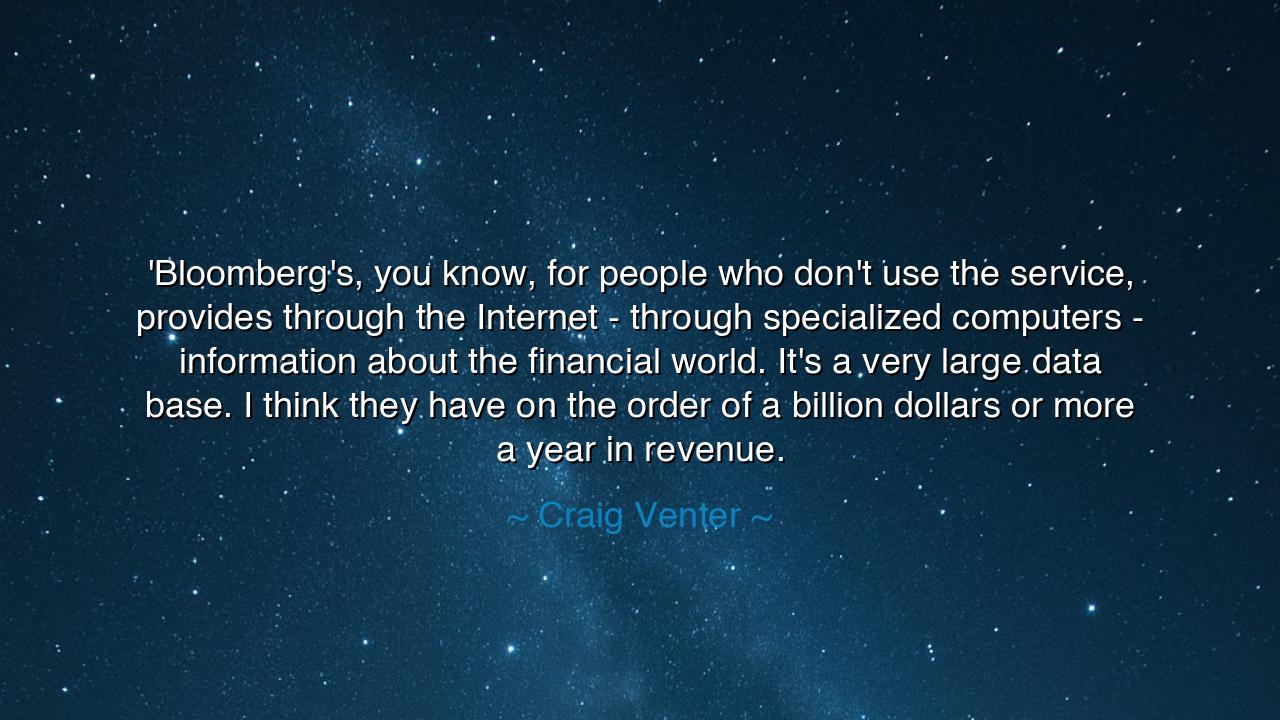
'Bloomberg's, you know, for people who don't use the service
'Bloomberg's, you know, for people who don't use the service, provides through the Internet - through specialized computers - information about the financial world. It's a very large data base. I think they have on the order of a billion dollars or more a year in revenue.






There are times when the words of a thinker, spoken plainly, carry within them the quiet thunder of revelation. Such are the words of Craig Venter, the pioneer who mapped the human genome and gazed deeply into the code of life itself. He once said, “‘Bloomberg’s, you know, for people who don't use the service, provides through the Internet—through specialized computers—information about the financial world. It's a very large database. I think they have on the order of a billion dollars or more a year in revenue.’” Though his words seem modest, even technical, they conceal a truth vast as the digital age itself: that information, when mastered and made to flow, becomes the new lifeblood of civilization.
In the ancient world, knowledge was guarded by temples and scholars, held in scrolls and passed by word of mouth. To know was to possess power, and to share it was to shape destiny. The Bloomberg system, as Venter describes, is the modern temple of this truth — a vast database, humming with the pulse of the world’s economies. It gathers the movements of markets, the whispers of trade, the rise and fall of fortunes, and it offers them to those who can interpret its signs. Just as the priests of Delphi once read the smoke of sacrifice, today’s financiers read the data of Bloomberg terminals. Venter, in naming this, reminds us that knowledge, when harnessed through technology, becomes a currency greater than gold.
Yet his words carry another meaning — a reflection on the evolution of humanity’s tools. Venter, who once decoded the very script of DNA, understands better than most that the power of systems like Bloomberg’s lies not merely in their machines, but in the minds that built and use them. The Internet, the computer, the database — these are extensions of human thought, externalized and amplified. They are mirrors in which our collective intelligence is reflected back to us, multiplied a thousandfold. The billion dollars of revenue is not merely profit; it is the valuation of human curiosity, organization, and the eternal hunger to make sense of the world’s chaos.
Consider, for example, the story of Michael Bloomberg himself — a man who once worked on Wall Street, who saw that information scattered was power wasted. He envisioned a single system that could gather the world’s financial data and deliver it to decision-makers instantly. From that vision, born not of inheritance but of insight, arose an empire of data. Bloomberg’s success was not in predicting the future, but in building the bridge that connected it. His creation transformed the markets, democratizing knowledge for those who dared to understand it. Thus, the story of Bloomberg is not merely one of wealth, but of innovation born from necessity — a truth as old as civilization itself.
But Venter’s tone is not one of worship. Beneath his calm explanation lies a subtle warning. For when knowledge becomes too vast, when it grows faster than wisdom, the balance of power shifts. Just as the ancients feared the fire of Prometheus, so too must we handle the fire of data with care. The system that informs can also mislead; the network that connects can also control. A database is a vessel of truth, but only when guided by discernment. Without understanding, we risk becoming servants to the very tools we created.
From this reflection arises a timeless lesson: technology must always serve human purpose, never replace it. Venter’s quote, though spoken in the language of commerce, points to a universal truth — that systems, whether biological or digital, find meaning only through the minds that wield them. The computer may gather the facts, but it is the human spirit that must interpret their worth. The measure of progress is not the size of our databases, but the wisdom with which we use them.
So, my listener, take heed of this teaching. Live in the world of machines, but remain master of your mind. Seek information, but also understanding. Build systems that uplift, not enslave. For the wealth of the future will not be stored in banks or screens, but in the clarity of those who can unite data with discernment. As Venter’s own life shows — from the genome to the global network — the greatest frontier is not the machine, but the mind that dares to comprehend it.
And so, let us remember: the database may hold the numbers of the world, but only the human heart can give those numbers meaning.






AAdministratorAdministrator
Welcome, honored guests. Please leave a comment, we will respond soon